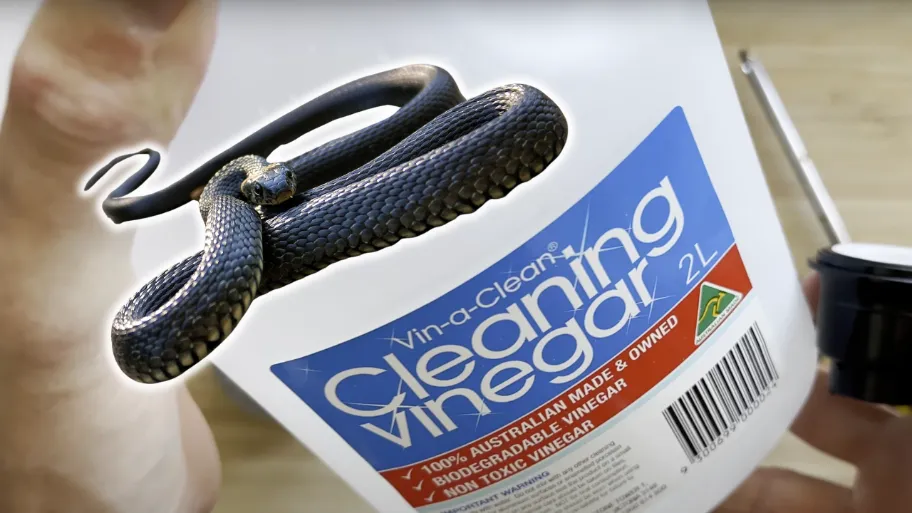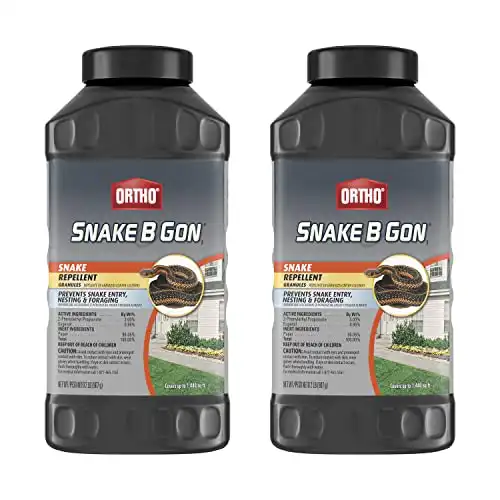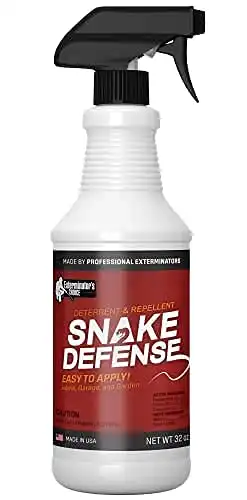I’m always on the lookout for effective snake repellents for my backyard or even my campsite.
I’ve seen those ultrasonic snake repellents advertised and they seem like a fantastic, hands-off solution. But they also seem a bit too good to be true so before I wasted my money (and before you waste yours) I did a bit of digging to find out whether or not they actually work.
It turns out these snake repellents are complete and utter “snake oil” and have no proof of effectiveness.
Ultrasonic snake repellents don’t seem to work and have no proof of effectiveness or even sound scientific reasoning behind them. The high-frequency sounds they emit don’t repel snakes and snakes have no problems moving around ultrasonic devices because snakes cannot even detect these frequencies.
Ultrasonic snake repellent products on Amazon either have little to no reviews or they are riddled with fake reviews making them seem more legitimate than they actually are. If you have a look at the 5 star reviews you can see that a lot of the time the review is for a completely different product.
I personally would avoid these products at all costs and invest in a snake repellent that actually works.
Your best bet for repelling snakes is to use a recommended commercial repellent that works to overwhelm a snake's sense of smell. Essential oils, ammonia or vinegar also work well as a snake repellent.
If you’re interested in buying ultrasonic snake repellents, it’s worth understanding how they work (or really I should say how they don't work) so you don’t waste your money.
They sound like a good idea on the surface, but if you dig a little deeper you'll find out there is no scientific basis behind these devices, no proof of effectiveness and even videos from snake trainers/handlers showing how snakes aren't effected by them at all.
Why Don’t Ultrasonic Snake Repellents Work?
Ultrasonic snake repellents don’t work because the high-frequency sounds they produce don’t put snakes off – in fact it's highly unlikely snakes can even hear the devices at all.
Scientific studies have proven that snakes don't seem to hear sounds with frequencies over 1,000 Hz and ultrasonic sound is anything over 20,000 Hz.
Sound is also not an effective snake repellent because it’s been scientifically proven that different snake species react differently to sounds – and most of these sounds being below the sound frequency used in the these devices.
Snakes Can’t Detect Ultrasonic Repellents
Many people have experimented with and tested ultrasonic snake repellents and video footage has proven that they don’t bother snakes.
The YouTube video below demonstrates how a brown king snake has no issues moving between several ultrasonic snake repellents:
The reason they don’t bother snakes is because snakes cannot detect high-frequency sounds.
According to Smithsonian’s National Zoo & Conservation Biology Institute, snakes can only sense vibrations of between 50 and 1,000 Hz.
They can only hear a portion of the sounds we hear. Snakes can detect vibrations between 50 and 1,000 Hertz, whereas humans can hear between 20 and 20,000 Hertz.
Smithsonian
Ultrasonic repellents produce sound frequencies of over 20,000 Hz, which is far above that which snakes can detect, making them nothing more than expensive garden decorations.

In addition, if you look at the data on the right of this graph (published on PubMed) showed that as sound frequencies increased, there was not a significant increase in snake movement.
Further suggesting that snakes are not afraid and don't move away from high frequency sounds and that ultrasonic repellents are likely to be ineffective.
If you wanted to repel snakes through sound, you’d need to use a much lower frequency device.
For instance, this study by the National Center for Biotechnology Information exposed sea snakes to various sound frequencies and revealed that they were most responsive to the 60 Hz frequency. This is well below the frequency of sound that ultrasonic snake repellents emit.
AEPs were recorded from 40 Hz (the lowest frequency tested) up to 600 Hz, with a peak in sensitivity identified at 60 Hz … Our data suggest that sea snakes are sensitive to low-frequency sounds
Source: Underwater hearing in sea snakes (Hydrophiinae)
To demonstrate what 60 Hz sounds like, check out this YouTube video:
Different Snake Species React Differently To Sounds
A 2023 study on how snakes respond to sounds in the air and ground revealed that different snake species respond differently to various sounds.
One species, the Woma Python, had a strong response to sound but other species (like Death Adders and Brown Snakes) showed a tendency to move away.
Snakes respond to sound by hissing, flicking their tongues and freezing, and won’t necessarily move away in response to a sound.
This means that unless you only have Death Adders or Brown Snakes in your yard, using low-frequency sounds as a snake repellent is unlikely be effective.
How Do Effective Snake Repellents Actually Work?
Effective snake repellents work on a snake’s highly advanced sense of smell and not their hearing, which has a very limited frequency range.
Snakes smell differently to us and their sense is smell is considered much better than humans. Snakes have a Jacobson’s Organ in their mouth that allows them to taste/smell even the tiniest scent particles in the air.
Certain potent smells can overwhelm a snake, and there are some smells that snakes don't like. Effective snake repellents contain these smells (or combinations of them) and this causes snakes to move in the opposite direction.
The most effective snake repellents that actually work contain these potent scents, and examples include sulfur and essential oils.
What Are Effective Snake Repellents?
Ultrasonic snake repellent devices are not effective at repelling snakes and I personally wouldn't waste my money on them. However, there are some effective snake repellents out there that do work.
So if you're camping and want to avoid snakes getting in your tent or you get snakes around your home and you want to get rid of them consider these options.
Effective snake repellents include habitat modification, physical barriers, rodent control and commercial products. Ammonia, vinegar and essential oils are also effective snake deterrents.
Habitat Modification
Snakes like habitats with plenty of long grass, trees, bushes and loose vegetation where they can hide and hunt.
By ensuring your yard has short grass, is weed-free and has no piles of dead leaves or branches, you can make it unattractive to snakes.
Physical Barriers
If you live in an area with a high snake population and want to stop them from entering your property completely, consider investing in a snake fence.
As long as the fence is embedded several inches into the ground and the holes are ¼ in diameter or less, snakes will be unable to breach the fence.
When camping, you can use a snake barrier (like the easy-to-set-up one from Atrox), as demonstrated in the video below:
Rodent Control
Snakes prey on rodents and other small creatures and if your property has a rodent problem, you have a higher chance of having snakes.
Controlling rodents is an effective but indirect way of keeping snakes away and you can do this by:
- Keeping your yard or campsite tidy
- Removing piles of dead vegetation
- Covering your compost heap
- Sweeping up food crumbs
Commercial Products
Good commercial snake repellents contain ingredients that snakes hate, such as sulfur or essential oils. One application typically lasts for 2-3 months, making it an economic snake deterrent.
For instance, Snake B Gon from Amazon contains several snake-repelling essential oils and comes in a handy container for easy application.
Alternatively check out my list of the best snake repellent powders on the market as there are a variety of good options out there.
This ready-to-use formula can cover approximately 1,440 sq. ft. per bottle and acts as a snake repellent to prevent them entering the area, nesting and foraging. Has a 'no-stink' formula and is long lasting up to 30 days.
Ammonia
Ammonia has a potent and unpleasant smell that works as an effective snake deterrent. However, since it’s toxic, you should avoid applying it directly to vegetation.
I sometimes use ammonia as a snake repellent when camping. Before I leave, I soak some kitchen towel in ammonia, place it in a ziplock bag and then open it so the fumes escape at my campsite.
Vinegar

Vinegar also works as a fantastic snake deterrent. I like to use white vinegar because it doesn’t stain lightly-colored surfaces and I also use it to clean my camping stove.
When camping, I place some white vinegar in a plastic spray bottle and use it as needed to deter snakes.
Essential Oils
There are many essential oils that snakes find repulsive. These include:
- Peppermint
- Cloves
- Cinnamon
- Cedarwood
- Citronella
If you don’t feel like mixing essential oils to make a DIY snake repellent, you could always buy a premixed one, like Snake Defense from Amazon. It’s safe to use around pets and kids and won’t harm your lawn or plants.
Works great on most common types of snakes such as Garter Snakes, Rattlesnakes, Copperheads, and many more. Features all-natural ingredients and no harmful chemicals, so it is safe to use around your pets and kids. Ingredients include clove, cinnamon, and peppermint oil.
To use the spray bottle, just a few spritzes using the included spray nozzle onto the designated area





